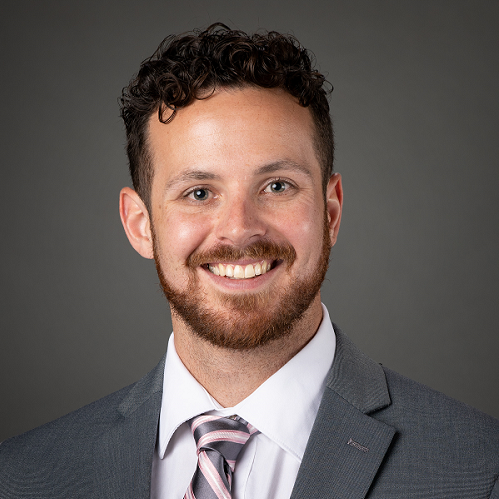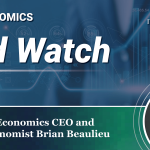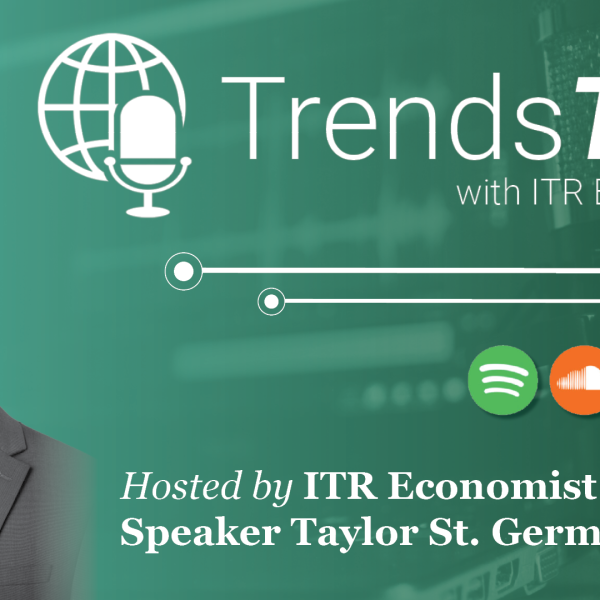- Mon - Fri: 8:30 - 5:00
- +1-603-796-2500
- ITR@itreconomics.com
May 20, 2024
- Home
- portfolio
- TrendsTalk
- May 20, 2024
with Taylor St. Germain
OVERCOMING COVID-19 CHALLENGES AS AN ELECTRONICS DISTRIBUTOR | WITH RIAD NIZAM
This week on TrendsTalk, we are joined by Master Electronics President Riad Nizam to discuss the challenges that COVID-19 presented, how ITR helped provide the business with confidence during that period, and his excitement about the coming years.

MEET YOUR HOST
Taylor St. Germain
As an experienced economist, Taylor St. Germain provides consulting services for small businesses, trade associations, and Fortune 500 companies across a spectrum of industries. His dynamic personality and extensive knowledge of economic trends and their business relevance are highly valued by clients and colleagues alike.
“Join me on the TrendsTalk podcast to explore the world of economics. Episodes offer insightful discussion and expert interviews. We cover relevant economic concepts in an accessible way. Whether you are a curious layperson or an industry professional, TrendsTalk is your go-to source for thought-provoking analysis and a deeper understanding of the economic forces shaping our world.”
Key Episode Takeaways
- 1:48 – Overview of Master Electronics
- 3:03 – Adapting to challenges from COVID-19
- 4:17 – How ITR Economics helped Master Electronics through the pandemic
- 5:25 – Master Electronics’ strategies for staying ahead of ever-changing technology landscape
- 9:00 – What Riad is most excited for in the second half of this decade
- 11:07 – Learn more about Master Electronics
- 12:15 – Conclusion
The below transcript is a literal translation of the podcast audio that has been machine generated by Rev.
Taylor St. Germain:
Hi everyone. My name is Taylor St. Germain with ITR Economics, and welcome to this edition of Trends Talk. Today’s a special episode. We had a special guest, Riad Nizam, from Master Electronics on Trends Talk. And one trend we’ve seen at ITR over the years is generational businesses using ITR as a data resource. We’re not just here for multinational corporations because every company out there has to sort through economic trends in the economic business cycle.
Taylor St. Germain:
So recently I had the opportunity to sit down with Riad and we talked about the post-Covid life for a semiconductor or microelectronics business, and dove into the practical strategies they incorporate to encourage innovation and creativity within the company to help navigate through the trends we see in the technology sector today and into the future. I hope you enjoy my conversation with Riad.
Taylor St. Germain:
Riad, thanks so much for joining us on Trends Talk. We appreciate it.
Riad Nizam:
Thanks. Thanks for having me, Taylor. Appreciate it.
Taylor St. Germain:
The first question I have for you, I’d love to know more about your journey to becoming the President of Master Electronics.
Riad Nizam:
Well, this is a family business. It started with my dad 57 years ago. I moved away twice for business and that really just helped me grow professionally, make decisions. Come into my own style that was different than, let’s say, my father’s or my brother’s, going to conferences, seminars. I did a couple of years at Harvard Business School and those things really helped influence me becoming president.
Taylor St. Germain:
And as far as Master Electronics’ mission, your day-to-day? Could you give us more insight about Master Electronics?
Riad Nizam:
Yeah, Master Electronics, we’re a electronic component distributor. We sell electronic parts that’s used for manufacturing. What I like to tell people now, because everyone doesn’t really know what that means, is we sell semiconductors. Now everyone knows what that is.
And three years ago, no one did. But anyone that builds anything with electronics, we sell the parts that go into it. And another way to say it, is we sell the little parts that go on those green boards that you see. And so we’re really at the start of creations, inventions, anything that happens. Our stuff goes in cars, airplanes, equipment, anything. Anything you have, your phone.
So that’s what we do and our mission is to be a family that uses collective superpowers to do significant good. Family is our company and our employees, but it’s also like our suppliers and our customers. Maybe the other thing I’ll point out is we use the mission and our core values to try to run the business, as strange as that might sound. Whenever I’m faced with a tough decision or I’m not sure what to do, I just kind of stare at our mission or core values and that usually leads to me in the right direction.
Taylor St. Germain:
Speaking about the business, this is an economics podcast, of course. We always have to bring it back to economics. And we’ve been through some challenging times, especially you say semiconductor and I know it’s more, it’s electronic components. Pretty disrupted, pretty big periods of disruption when it comes to the last few years, really the post-pandemic world. I’m curious, when you look at how the company has adapted to changes, especially considering Covid, all of the challenges, the shifts in the market, all of those nuances that went along with it, how have you been able to adapt as an organization?
Riad Nizam:
Yeah, so on the economic side, the biggest shift that Covid had on our business is people went from buying services to stuff. So instead of going on vacation, people bought a new car. Instead of going to concerts and shows, they remodeled their kitchen with new appliances that have electronics. And all of that kind of came our way. So we just saw a tremendous uptick in business that we never expected, and our business doubled over Covid. We hit our five-year goal in one year.
And one thing about ITR is ITR really gave us confidence in investing in inventory before it happened. We felt confident, but we were hesitant. And our calls with you kind of in June of 2020 was I would invest in the future. I don’t think any of us knew it would come up that big or that fast, but I would invest. You gave us confidence to invest and that was really helpful. It helped us capitalize. So that’s one major way Things changed.
Work from home. I was an anti-, anti-, anti-, work from home person. I was an ass in the seat person. And we work from home. We’re a three days in the office, two days at home for the whole company. I think it’s helped us trust each other more and I think it’s made us grateful for the people and model we have. I think it’s made us more appreciative.
Taylor St. Germain:
Yes, the people challenge with Covid was significant. I had always gone into an office for the majority of my life as well. As we talk about how our lives have changed, how the economy has changed, how businesses have changed, one of the questions I was curious about, especially as you’re in an industry that is sort of at the heart of technology and changing technology. Within your own organization, how do you foster a culture of innovation? And maybe an extension of that, what strategies do you employ to stay ahead of this ever-changing technological landscape that we have out in front of us?
Riad Nizam:
Some simple things that we implement at Master Electronics that I think helps spur innovation and getting stuff done is something called the 1-3-1 as an example. So 1-3-1 is you are a person that works here, you have an issue or challenge. That’s the one. The three is coming up with three possible solutions. And then the one is your recommendation. And most people just go to one solution, which is what’s most natural to them, and they don’t really think deeply about it. When you think deeply, it helps you spur innovation, new ideas, and go after stuff. That’s one thing we do.
The other thing we do is called the just-do-it test. If you answer yes to these four questions, we say just do it and don’t ask anyone for permission. So that is, is it good for the customer? Is it good for Master Electronics? Is it ethical? And can I support my decision? If you answer yes to those, just make the decision and don’t wait for people. That spurs speed and empowerment, and when you have speed and empowerment, people come up with better ideas.
So those are kind of two strategies we use are very practical. They’re easy to execute. They cost no money almost. So I recommend those. And then the other thing I think is just education. So we really encourage people to go to conferences, to go to school. We have a tuition reimbursement program that you can use. It doesn’t have to be anything for the business.
Taylor St. Germain:
Yeah. I’m curious. In that 1-3-1 approach, if you run with one of the three recommendations, do you ever find yourself, or someone after they made that recommendation, actually going back to one of the other two and those end up being better than the one they picked?
Riad Nizam:
Yeah, God, I think it sometimes happens, but since we go through that kind of deep thinking and there could be discussion you have with someone, I think we usually get it right with the one, because we go through the three. If we don’t go through the three, then I think that would happen a lot more.
And sometimes it’s a hard decision. In a sales example, let’s say we’re going through a competitive situation on pricing and we have to be this low price to retain our business that doesn’t make sense financially. A salesperson never says we can walk away, but that’s an option. And so I think since we go through that kind of deep thinking, I think we get it right most of the time. So I would say no overall.
Taylor St. Germain:
I really liked it. And yeah, because I guess my mind was like, well, you have three approaches and even if one doesn’t work, you might have some backups that could work better. But it sounds like you actually saved the time by starting with those three approaches and getting to the final.
Riad Nizam:
I think so. But I think sometimes on bigger things when you have possible two approaches, I think it does happen. Just less than you would think.
Taylor St. Germain:
Sure. That’s great. And Riad, one final question for you. What are you most excited about when you look forward to the future coming years, the second half of this decade? Whether it’s your personal life, whether it’s Master Electronics, the economy overall, what excites you the most about where we’re headed here over the next few years?
Riad Nizam:
Yeah, I think I’ll start with the business economy wise. I think it’s kind of like industrial revolution of on-shoring in the US and Mexico, I think is really good for our business. We’re about 80% in North America, and so that should be an uptick in business and manufacturing here. So I’m excited about that.
I’m excited about AI. I’m really excited about what that’s going to do to our business. I think a lot of people are concerned about their jobs and I think there is some concern there. Our goal would not be to reduce people, but just to grow without adding as much, and taking off tasks and things that can be automated so you can spend time on the stuff that needs critical thinking, that needs relationship. So I think AI is exciting. I think we’re just on the forefront of that. I’m really excited to see that come to practical use for us. There’s more like trucks being used every day, so the content in cars and everything you do, more trucks are used every single day. And so that’s good for us.
Personally, I have passion for helping family businesses do what my family business has done. So I’d love to speak and consult for family businesses. You can check out my website at riadnizam.com. You’ll see videos on the 1-3-1 and just do a test there. So I personally have a passion on kind of spreading that knowledge and seeing if I can help family businesses. I think I love family businesses and I think I can add some value there.
Taylor St. Germain:
And as you and I have talked, especially as we prepare for the second half of this decade, family businesses are going to need some trusted advisors out there to navigate this economic landscape. So Riad, thanks so much for joining us here today. We really appreciate it, and appreciate you coming on and sharing more. I know you shared a little bit about where folks can find you on your personal website. I just wanted to allow you to take a second to share where folks can find Master Electronics and more about your organization.
Riad Nizam:
Yeah, Master Electronics, you can find us at masterelectronics.com. You can purchase from us online with a click of a button, or you can work with a salesperson. We have 16 offices, a few in Canada, 10 in North America, two in Asia, one in Mexico. So you can work with us any way you want. And I would say we’re just an easy to work with fun company that adds value to our customers. And we believe in inventory. We have a ton of inventory. So if you need inventory and a secure supply, we’re the company for you.
Taylor St. Germain:
Great. I can certainly vouch for it being a fun company. I enjoy working with you all. And again, thanks for joining us here today. We really appreciate you having us on Trends Talk.
Riad Nizam:
Thanks a lot, Taylor. It’s been fun being here.
Taylor St. Germain:
Thanks so much for tuning in to this episode of Trends Talk. As a reminder, please like and subscribe to Trends Talk wherever you listen to your podcasts, and we look forward to seeing you on the next one. Take care.






